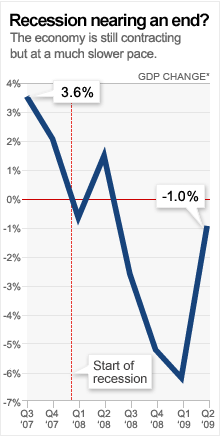The pain is starting to ease - GDP report
The nation's gross domestic product declined 1% in the second quarter, less than expected and better than the first quarter's drop.

NEW YORK (CNNMoney.com) -- The pace of economic decline slowed substantially in the second quarter, as the U.S. economy shrank at an annual rate of 1% -- far less than it did in the first quarter, according to a government report released Friday.
Economists surveyed on Briefing.com expected the GDP to contract by 1.5%.
GDP is the broadest measure of the economy, which has been mired in recession since December 2007, worsening in recent quarters. The fourth quarter of 2008 and first quarter of 2009 measured the worst two quarterly declines in 26 years -- the nation's gross domestic product fell a revised 5.4% and 6.4% respectively.
The slower second-quarter contraction was largely due to a smaller decline in exports and business inventories as consumer prices and government spending rocketed higher.
Businesses spending fell by 8.9% last quarter, compared with a 39.2% drop in the first quarter. The decline in business inventories also took a significantly smaller bite out of GDP in the most recent quarter than in the previous two.
Federal government spending grew by 10.9% in the quarter, after falling by 4.3% in the first quarter. That was only partially aided by the stimulus program, as very little of Recovery Act funds were spent between April and June.
That partially offset a 1.2% decline in consumer spending, which makes up about 70% of GDP. In the first quarter, consumer spending was actually up 0.6%.
GDP has contracted for four straight quarters -- the first time that has happened since the Commerce Department began tracking that measure in 1947. But the most recent quarterly decline is the smallest since the second quarter of 2008, giving hope to some economists that the recession is at or nearing an end.
President Obama sounded a note of caution, saying at a news conference Friday afternoon that the economy has not yet begun to recover, but the GDP numbers were "encouraging."
"We won't have a recovery as long as we're losing jobs, [but] you need to have economic growth before you have job growth," said Obama. "Today's GDP is an encouraging sign that the economy is heading in the right direction. That means, eventually, businesses will start growing and will start hiring again. But this won't happen overnight."
Farewell recession? Lakshman Achuthan, managing director of the Economic Cycle Research Institute, said the GDP number was encouraging, and he expects the recession to come to an end this summer. While GDP is a trailing indicator, he said the change in direction suggests the worst is behind us.
"As we suspected, things got a lot less bad in terms of economic activity. It means we turned a corner earlier this year in terms of the severity of the recession," he said. "The free market correction is abating quickly."
Achuthan said the recession turned into "an abyss" last fall as the credit market froze. But trillions of dollars in government programs to ease credit have largely succeeded, which helped normal business cycle dynamics take over.
"The vicious cycle is become virtuous," he said. "Confidence is returning, pent-up demand is creating higher prices, and the economy is getting stronger."
ECRI's leading indicators, which predict future economic conditions, have rocketed to a five-year high. Achuthan said that suggests we have reached the bottom, bringing about an end to the latest round of economic contractions. He also said data suggest there will be no double-dip recession, or an 'L-shaped' recovery, in which the economy revives but stagnates.
Still, the labor market remains distraught, and the economy will need to stop shedding jobs to begin a real rebound. Since the economy still faces real challenges, Achuthan thinks it will be a "small 'v' shaped recovery instead of a big 'V.'"
The National Bureau of Economic Analysis, which declares the beginning and end of recessions, takes into consideration more factors than just GDP, including job growth. It also doesn't typically doesn't officially call the start or end until several months later. ![]()

